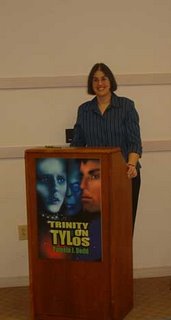Have you seen V for Vendetta?
I won't write a review per se of V for Vendetta, because there are many of those available, but I would like to comment on it. I can't believe that it will be anything more than a cult classic in a year or so, but for right now, it brings the role of science fiction as literature to the forefront.
Joseph Campbell described science fiction as mythology for modern man. Back in graduate school, I wrote a paper or two on themes found in science fiction, and there are a number of classic themes on which virtually all sci-fi must rely, including man vs. machine and utopia/dystopia. V for Vendetta is a modernized Nazi movie, and often looks more like the alternate history theme rather than the dystopia it intends to portray. Yet, the literate script and an unusually complex plot which never loses the viewer seem unusual. I have grown accustomed to most sci-fi on the screen being neither literate nor clear-sighted, and V for Vendetta is both.
Probably, some viewers will be intrigued by the “terrorism” controversy. Others will be enticed to view the film by the voyeuristic glimpses of Natalie Portman being shaved bald which are in the trailer, but this flick is more complex than most screen versions of graphic novels. However, after all the quotes from Shakespeare and emotional epiphanies are done, it is still a story about a dude in a mask who blows stuff up. All during the movie, I simply could not forget that it all began as a comic.
At its best, science fiction offers another way to examine what it means to be human, and in that V for Vendetta doesn’t fail.
Labels: film, media, politics, science fiction, themes

